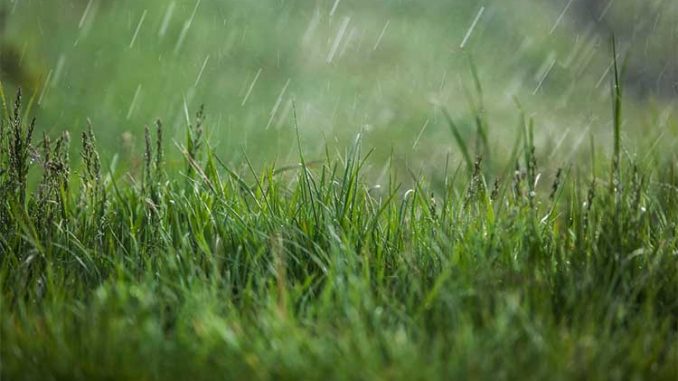
It has been said that the best time to fertilize your yard is after a heavy downpour. However, it has also been said that too much moisture can be detrimental to the effectiveness of your fertilizer spread. It can also overflow into straights springs and waterways and render your lawn a hazard to the environment.
Well-kept yards and nurseries require a mix of the correct components. Notwithstanding the suitable measure of water, daylight, carbon dioxide, and oxygen, the roots additionally need the correct sort of supplements. Similarly, as people may take nutrients or enhancements to guarantee they’re getting what they need, the same principle applies for yards. This is the reason individuals include manures into their cultivating schedule, which holds the best possible supplements in the perfect sums for typical yards. So, how much rain is too much after fertilizing your yard? Read on to find out!
Rain & Your Fertilizer
Numerous plant specialists use fertilizer so as to help cause their yards or nurseries to become quicker and be more advantageous. Despite the fact that making sense of how and when to utilize compost is genuinely clear, there are constantly a couple of inquiries brought about how best to utilize it. Since the rain, one would say, is one of the most natural approaches to help plants develop normally, in what manner should plant specialists approach preparing their yards and nurseries when a rainstorm is going to hit? Over-preparing plants is a colossal worry for anybody and so is over-watering, and so it is essential to realize how to organize preparation with the climate, as well as realizing the
The Good & Bad of Moderate Rainfall
Watering a short time after some rain might be the best arrangement from a strictly ecological outlook. Despite the fact that overwhelming precipitation might be incredible for treating your very own grass or nursery, it’s not perfect for nature. This is on the grounds that treating before substantial precipitation will add to water contamination somewhat.
Fertilizer that proceeds a downpour will end up flowing into neighborhood waterways, lakes, springs, and inlets. Since nitrogen is the key fixing that yards take from manures, this can shape nitrate, which can seriously affect water quality just as plants and creatures living around these waterways.
Step by Step Instructions to Water-In Fertilizer
For nursery workers who were planning to utilize the substantial precipitation to water in their compost, there are different arrangements that will profit the yard without putting nature in danger. One is the trick can test, which discloses to you to what extent you’ll have to turn on your water system to successfully water-in compost. Take a few void fish jars and spot them around the grass. When you start watering, time to what extent it takes for the jars to be filled to 1/4 inch.
This much water is sufficient for the yard to ingest the supplements at the root-level, which is perfect. Any less wouldn’t be adequate, and any more can suffocate the grass inside and out. As is with all things in regards to agribusiness, the appropriate response is perpetual; it depends! Substantial downpour in exceptionally light and sandy soils following compost is typically a terrible thing since it flushes the fertilizer out of the soil and into streams and waterways.
This is particularly true with nitrogen manures and less so with phosphorus and potash. However, on some earth soils, it very well may be less hazardous as mud soils will, in general, hold dampness and water better. Most likely, the ideal situation would be a suitable level (as indicated by soil type and manure holding limit of the dirt) of quick discharge compost pursued by a light downpour at first. This will help get the manure really get into the dirt and shield it from gassing off sitting over the ground. After that happens, then any climate ought to be fine dry climate or downpour won’t make any difference?
After Heavy Rain
The heavy rains that usually set in around May might have greened up our gardens and given us some late-spring investment funds on our water bills. What a great many people might not have acknowledged is that the serious precipitation in such a brief timeframe likewise drained supplements from our dirt, especially nitrogen.
Nitrogen is the most water solvent macronutrient that is utilized by plants. It is easily disolved in water and taken up by grass and different plants through the roots. Nitrogen is accountable for healthy leaf development and is fundamental in the creation of new leaves and shoots.
It cannot be denied that lakes and rivers are the best types of irrigation systems, and that grass and plants flourish when water originates from Mother Nature.
Some portion of this phenomenon is because of low degrees of nitrogen found in water; be that as it may, it isn’t sufficient for the high supplement requests of our yards and scenes which we need to be lavish and dull green. That requires extra manure.
Upsides and Downsides of Fertilizing After Heavy Rain
Cultivators may pick prepare after substantial precipitation since it will help increment the viability of the compost in the yard or nursery. It will likewise help diminish the odds of the compost running off into water frameworks and dirtying it.
Then again, watering after overwhelming precipitation could imply that plant specialists won’t exploit the normal method to get the manure into the yard. It’s hard to get the proper measure of land inclusion just from sprinklers or watering without anyone else’s input. Be that as it may, downpour could land the position of watering-in manure shown improvement over some other strategies.
Conclusion
The bottom line, therefore, is that some rain is not harmful, but too much is. Excessive rainfall runs the risk of washing away all the vital nutrients that were in the fertilizer you applied to the soil.
Good luck!

Be the first to comment